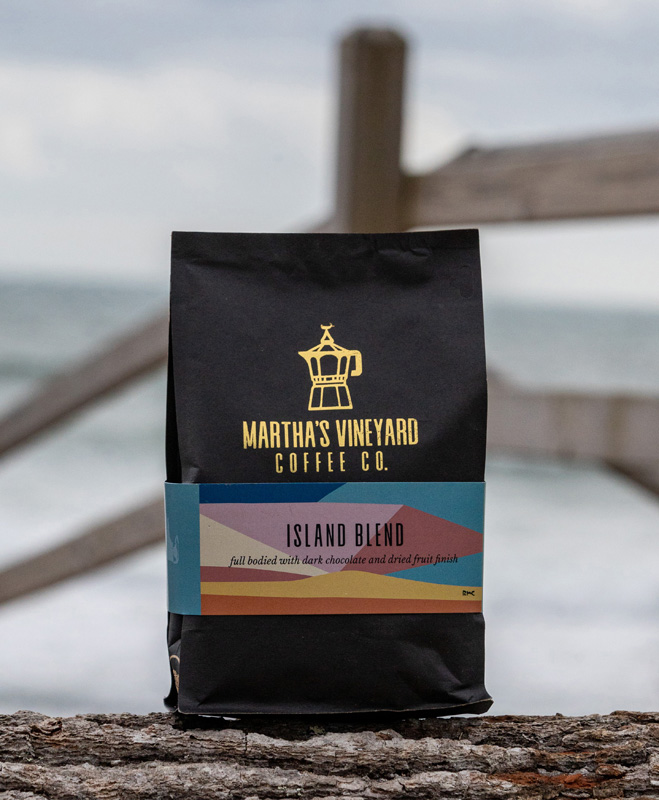Handmade oyster knives by Colin Ruel
Menemsha native Colin Ruel is best known for his beautiful, atmospheric paintings on wood panels. More recently Ruel has turned his attention to a very different sort of art form. Last year the artist started experimenting with metalsmithing, and he is now offering one-of-a-kind oyster knives made of high-carbon steel with wooden handles.
The knives feature a variety of woods for the handles. “I try to use wood with a local provenance,” says Ruel. These options include Chilmark maple, Vineyard oak, and ebony from the 1854 Cuttyhunk shipwreck of the Dolphin, which Ruel was able to purchase from sources on the tiny Island at the outermost reaches of the Elizabeth Islands.

Ruel, who spent some time living in Brooklyn, has also sourced some purpleheart wood from 100-year-old New York City park benches. Purpleheart, which comes from Central and South America, is increasingly rare. Like the name implies, the hues range from brownish purple to a deep eggplant.
The handles are decorated variously with quahog shells, swordfish fins, and brass castings by Ruel’s wife, Nettie Kent.
The Ruel Gallery, situated in Menemsha in the building that once served as a garage for Ruel’s great-grandfather’s Model A Ford, features the artist’s ethereal paintings along with Kent’s hand-forged sterling silver and gold jewelry made from reclaimed materials. Kent’s simple yet elegant designs, like her husband’s paintings, are inspired by the Island where they both grew up. The oyster knives, which have been purchased by oyster farmers and professional shuckers from New England and elsewhere, are the perfect complement to artwork informed by the couple’s lifelong passion for the Island.
Find Colin Ruel’s oyster knives at ruelgallery.com and on Instagram at instagram.com/colinruel.
Martha’s Vineyard Coffee Co.
Leif Iverson knows coffee. His experience working as a barista while in college led him to explore Costa Rica’s famous coffee plantations, where he forged relationships within the small farming communities. This eventually led to Iverson’s desire to bring quality locally roasted coffee to the Vineyard.
“I want to bring this sense of enjoyment to the Island community where I was fortunate enough to grow up,” writes Iverson on his website. “The quality of life here on the Vineyard is hard to beat. The coffee experience should be no exception.”

What makes Martha’s Vineyard Coffee Co.’s product so superior is the way that Iverson sources his green beans for roasting. He deals exclusively with small coffee growers in Costa Rica, as well as one in Brazil. “It’s a far better practice than fair trade. You’re actually negotiating with the farmer,” says Iverson, whose mother once owned a farm in Costa Rica that he visited frequently while growing up.
Not only is Iverson supporting South American farmers, he explains how his practice of buying directly from small farms is sustainably responsible. All of his products come from “shade-growth” farms, which means that the beans grow under a forest canopy with tall trees and a diverse habitat. “All of the beans are grown with biodiversity in mind,” says Iverson. “There is no clear-cutting of the jungle or growing of monocrops, which can negatively impact the soil.”
Shade-grown beans, as Iverson explains, are also of a superior quality. “Because you’re keeping all of these native trees, it keeps the soil quality high,” he says, adding, “when you have the overstory trees providing shade, it helps the coffee ripen slowly.”
Iverson’s expertise and passion for everything connected to coffee is reflected in the descriptions on the website of the various blends (or single-source) products. With the specificity of a wine expert, Iverson describes the coffees variously as having notes of “milk chocolate, toffee, sugar cookie, peach, lemon, sweet cream” or “brown sugar, honey, walnut, silky body with a sweet apple finish.”
“With small-batch roasting, you’re able to highlight the best quality and aspects of that green bean,” says Iverson. “You’re really able to capture a lot of the nuances of the origin flavor.”
Martha’s Vineyard Coffee Co. products (bags and brewed cups) can be purchased at a number of Island stores, bakeries, farmstands, and restaurants. You can also order online at marthasvineyardcoffeeco.com.
Ganola
Ganola — that’s not a typo. It’s the brand name for Erin Doyle’s all-organic granola, which she distributes to the Island Grown Initiative (IGI), the Island Food Pantry, and other Island organizations, and also offers for sale at a number of local outlets.
Doyle, who works with IGI, an organization dedicated to making healthy, local, nutritious food available throughout the community, was offered a grant in 2021 to start up her own business. Using a recipe that she developed with her mother, Doyle had been making granola for years to give out to friends and family.

When offered the grant, the young entrepreneur knew immediately that she wanted to turn her hobby into a business while also offering a service to Island.
With the help of Beth Kramer, a colleague of hers from the former Chilmark Chocolates, Doyle launched her business last year, and it has grown in leaps and bounds. “They can’t keep it on the shelves,” she says.
Once she decided to make large batches for distribution, Doyle spent a lot of time researching sources for the ingredients. Ganola is hardly your average homemade version of the healthy breakfast and snack food. There are more than 15 ingredients in every batch, and they are all organic. Eventually Doyle hopes to use Island-grown cranberries and oats. The packaging is environmentally friendly recycled paper bags.
Currently Doyle is employing two of her former co-workers from Chilmark Chocolates, and in the future she hopes to bring on more members of the staff from that now shuttered business, which had a long history of hiring other-abled workers during the course of its decades-long run.
Doyle is also giving back to the community by donating 25 percent of the profits from each bag to the Island Food Pantry, which provides groceries and fresh foods to hundreds of families and individuals on the Island.
Now that her business has taken off, Doyle is realizing that she may have gotten more than she bargained for. She takes part in every facet of the process — from making the granola to distributing it to promotion. She’s a tireless worker who is enjoying every aspect of the enterprise, although she says that her favorite job is the production end. Doyle has always loved to cook, and she has now turned a passion into a cottage industry. “It’s been great,” she says. “In the summer when it was busy, it was a bit challenging, but really exciting to see it grow.”
You can purchase Ganola at the following outlets: Cronig’s Market, Up-Island Cronig’s, North Tisbury Farm Market, Ghost Island Farm, and North Tabor Farm.


Mail order? To DC?
Thanks Susan! We’re going to check with Erin and we’ll let you know!